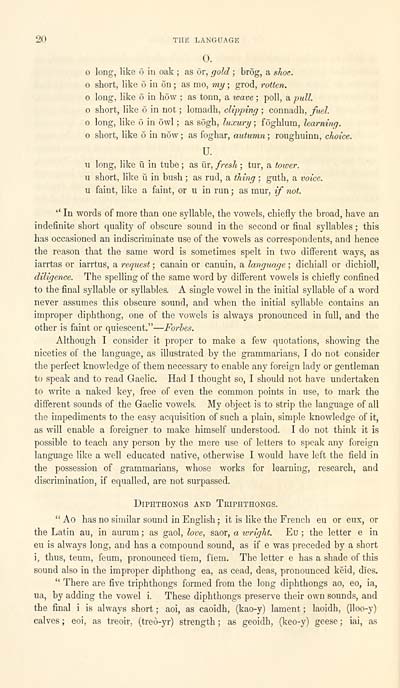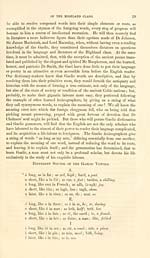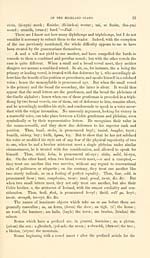Download files
Complete book:
Individual page:
Thumbnail gallery: Grid view | List view

20 THE LANGUAGE
0.
long, like o in oak ; as or, (jold ; bròg, a shoe.
short, like 6 in on ; as mo, my ; grod, rotten.
long, like 5 in how ; as tonn, a wave ; poll, a pull.
o short, like 6 in not ; lomadh, clipping ; connadh, fuel.
o long, like 5 in owl ; as s6gh, luxury ; f oghlum, learning.
short, like 6 in now ; as foghar, autumn ; roughuinn, choice.
U.
11 long, like ù in tube; as in; fresh; tur, a tower.
11 short, like li in bush ; as rud, a thing ; guth, a voice.
u faint, like a faint, or u in run ; as mur, if not.
'' lu words of more than one s^dlable, the vowels, chiefly the broad, have an
indefinite short quality of obscure sound in the second or final syllables ; this
has occasioned an indiscriminate use of the vowels as correspondents, and hence
the reason that the same word is sometimes spelt in two different ways, as
iarrtas or iarrtus, a request ; canain or canuin, a language ; dichiall or dichioU,
diligence. The spelling of the same word by different vowels is chiefly confined
to the final syllable or syllables. A single vowel in the initial syllable of a word
never assumes this obscure sound, and when the initial syllable contains an
improper diphthong, one of the vowels is always pronounced in full, and the
other is faint or quiescent." — Forbes.
Although I consider it proper to make a few quotations, showing the
niceties of the language, as illustrated by the grammarians, I do not consider
the perfect knowledge of them necessary to enable any foreign lady or gentleman
to speak and to read Gaelic. Had I thought so, I should not have undertaken
to write a naked key, free of even the common points in use, to mark the
different sounds of the Gaelic vowels. My object is to strip the language of all
the impediments to the easy acquisition of such a plain, simple knowledge of it,
as will enable a foreigner to make himself understood. I do not think it is
possible to teach any person by the mere use of letters to speak any foreign
language like a well educated native, otherwise I would have left the field in
the possession of grammarians, whose works for learning, research, and
discrimination, if equalled, are not surpassed.
Diphthongs and Triphthongs.
" Ac has no similar sound in English ; it is like the French eu or eux, or
the Latin au, in aurum ; as gaol, love, saor, a toright. Eu ; the letter e in
eu is always long, and has a compound sound, as if e was preceded by a short
i, thus, teum, feum, pronounced tiem, fiem. The letter e has a shade of this
sound also in the improper diphthong ea, as cead, deas, pronounced kcid, dies.
" There are five triphthongs formed from the long diphthongs ao, eo, ia,
ua, by adding the vowel i. These diphthongs preserve their own sounds, and
the final i is always short ; aoi, as caoidh, (kao-y) lament ; laoidh, (lloo-y)
calves ; eoi, as treoir, (treò-yr) strength ; as geoidh, (keo-y) geese ; iai, as
0.
long, like o in oak ; as or, (jold ; bròg, a shoe.
short, like 6 in on ; as mo, my ; grod, rotten.
long, like 5 in how ; as tonn, a wave ; poll, a pull.
o short, like 6 in not ; lomadh, clipping ; connadh, fuel.
o long, like 5 in owl ; as s6gh, luxury ; f oghlum, learning.
short, like 6 in now ; as foghar, autumn ; roughuinn, choice.
U.
11 long, like ù in tube; as in; fresh; tur, a tower.
11 short, like li in bush ; as rud, a thing ; guth, a voice.
u faint, like a faint, or u in run ; as mur, if not.
'' lu words of more than one s^dlable, the vowels, chiefly the broad, have an
indefinite short quality of obscure sound in the second or final syllables ; this
has occasioned an indiscriminate use of the vowels as correspondents, and hence
the reason that the same word is sometimes spelt in two different ways, as
iarrtas or iarrtus, a request ; canain or canuin, a language ; dichiall or dichioU,
diligence. The spelling of the same word by different vowels is chiefly confined
to the final syllable or syllables. A single vowel in the initial syllable of a word
never assumes this obscure sound, and when the initial syllable contains an
improper diphthong, one of the vowels is always pronounced in full, and the
other is faint or quiescent." — Forbes.
Although I consider it proper to make a few quotations, showing the
niceties of the language, as illustrated by the grammarians, I do not consider
the perfect knowledge of them necessary to enable any foreign lady or gentleman
to speak and to read Gaelic. Had I thought so, I should not have undertaken
to write a naked key, free of even the common points in use, to mark the
different sounds of the Gaelic vowels. My object is to strip the language of all
the impediments to the easy acquisition of such a plain, simple knowledge of it,
as will enable a foreigner to make himself understood. I do not think it is
possible to teach any person by the mere use of letters to speak any foreign
language like a well educated native, otherwise I would have left the field in
the possession of grammarians, whose works for learning, research, and
discrimination, if equalled, are not surpassed.
Diphthongs and Triphthongs.
" Ac has no similar sound in English ; it is like the French eu or eux, or
the Latin au, in aurum ; as gaol, love, saor, a toright. Eu ; the letter e in
eu is always long, and has a compound sound, as if e was preceded by a short
i, thus, teum, feum, pronounced tiem, fiem. The letter e has a shade of this
sound also in the improper diphthong ea, as cead, deas, pronounced kcid, dies.
" There are five triphthongs formed from the long diphthongs ao, eo, ia,
ua, by adding the vowel i. These diphthongs preserve their own sounds, and
the final i is always short ; aoi, as caoidh, (kao-y) lament ; laoidh, (lloo-y)
calves ; eoi, as treoir, (treò-yr) strength ; as geoidh, (keo-y) geese ; iai, as
Set display mode to: Large image | Transcription
Images and transcriptions on this page, including medium image downloads, may be used under the Creative Commons Attribution 4.0 International Licence unless otherwise stated. ![]()
| Early Gaelic Book Collections > Blair Collection > Treatise on the language, poetry, and music of the Highland clans > (32) |
|---|
| Permanent URL | https://digital.nls.uk/76236755 |
|---|
| Description | A selection of books from a collection of more than 500 titles, mostly on religious and literary topics. Also includes some material dealing with other Celtic languages and societies. Collection created towards the end of the 19th century by Lady Evelyn Stewart Murray. |
|---|
| Description | Selected items from five 'Special and Named Printed Collections'. Includes books in Gaelic and other Celtic languages, works about the Gaels, their languages, literature, culture and history. |
|---|

